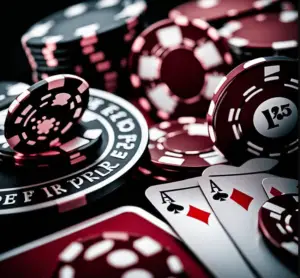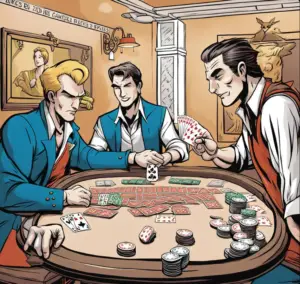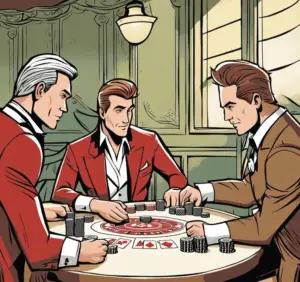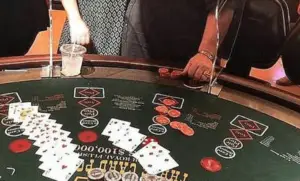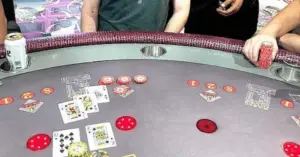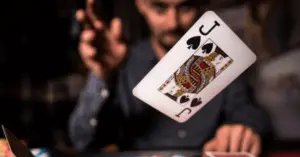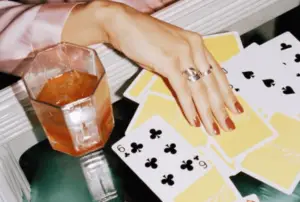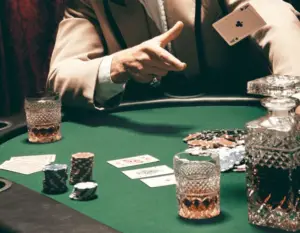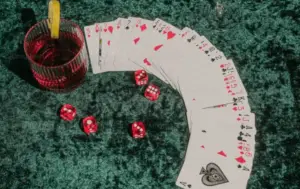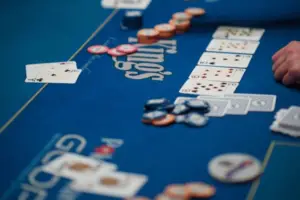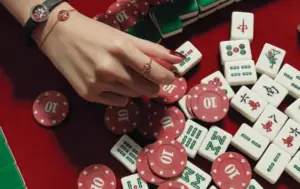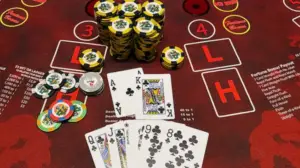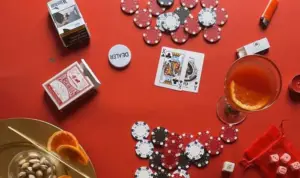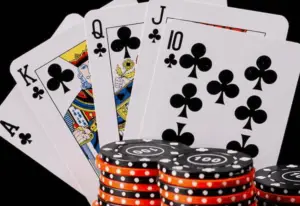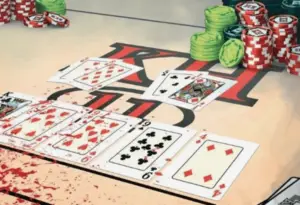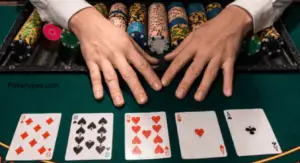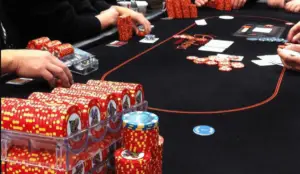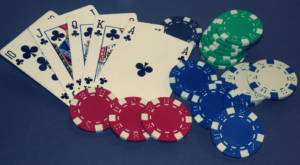Poker etiquette plays a vital role in creating a pleasant and enjoyable experience at the poker table. While the official rules of poker are well-known, there are also many unwritten rules that every player should follow to maintain a respectful and friendly atmosphere.
These unspoken guidelines include acting in turn, being clear with your actions, keeping your emotions in check, and respecting your fellow players and the dealer.
Proper poker etiquette not only ensures a smooth flow of the game but also prevents misunderstandings and conflicts that can arise from poor behavior.
The following etiquette rules will help players focus on the skill and strategy aspects of the game while fostering camaraderie.
If you want to maximize your time at the tables, you must understand and practice good poker etiquette.
General Table Etiquette
When you sit down at a poker table, it’s crucial to follow some basic rules to keep the game running smoothly. Take a look at the dos and don’ts of general table etiquette that’ll make you a welcome player at any table.
1. Pay Attention to the Action
Staying focused on the game is key. It’s like being the star player in a big game – you’ve got to keep your head in it!
When you’re at the table, make sure you’re watching what’s happening. This means keeping an eye on the dealer, the cards, and your fellow players.
Don’t get distracted by your phone, music, or chatting with your buddies. It’s a real bummer when someone holds up the game because they’re too busy texting.
In fact, a survey by PokerStars found that 78% of players think using phones at the table is the most annoying behavior. So, put that phone away and stay in the game!
2. Act in a Timely Manner
When it’s your turn to act, don’t dawdle! Quick decision-making keeps the game moving and shows respect for other players’ time.
You don’t want to be that guy who takes forever to make a move – it’s not cool, and it can even get you penalized in some games.
A good rule of thumb is to pre-plan your actions. While others are playing with their hands, think about what you’ll do when it’s your turn. This way, you’re ready to go when the action comes to you.
3. Respect Other Players and the Dealer
Being polite and courteous at the table isn’t just good manners – it’s essential for a fun game. Treat everyone at the table like you’d want to be treated. This includes your fellow players and the dealer.
Don’t berate or criticize others, even if they make a play you think is dumb. Remember, everyone’s there to have a good time. Bad beats happen to everyone, so don’t throw a fit if you lose a hand you thought you’d win.
4. Keep Chip Stacks Visible
Your chip stack should be like an open book – easy for everyone to read. Keep your chips neatly stacked with the high denominations in front. This isn’t just for show – it’s a rule in most poker rooms.
Why? Well, it allows opponents to easily determine your stack size. In poker, knowing how much someone has to play with is crucial info. It helps players make better decisions about whether to bet, call, or fold.
Hiding large chips is a big no-no. It’s called angle shooting, and it’s considered cheating. You don’t want to be that player who’s trying to trick others – it’ll get you in hot water fast!
Examples of Good Table Etiquette
Let’s paint a picture of good etiquette in action:
Sarah sits down at a $1/$2 No-Limit Hold’em game. She stacks her chips neatly, with her $100 chips clearly visible in front.
When it’s her turn to act, Sarah quickly folds her hand and places her cards face down in front of her.
Tom, another player, loses a big pot. Instead of complaining, he simply says, “Nice hand,” to the winner.
The dealer makes a small mistake. Sarah politely points it out without making a fuss, and the error is quickly corrected.
During a hand, Sarah’s phone buzzes. Instead of checking it, she ignores it until the hand is over.
These simple actions keep the game flowing smoothly and create a positive atmosphere at the table.
The Impact of Good Etiquette
Following good etiquette isn’t just about being nice – it can actually improve your game! When you’re respectful and attentive, other players are more likely to enjoy playing with you. This can lead to more invites to private games or a better reputation at your local casino.
Plus, when you’re focused on the game and not distracted, you’re more likely to pick up on tells and make better decisions. It’s a win-win situation!
Remember, poker is a social game. By following these etiquette rules, you’re not just being a good player – you’re being a good person. And in the long run, that’s what really counts at the poker table.
Acting in Turn
In the world of poker, acting in turn is a golden rule that every player must follow. It’s like waiting for your cue in a play – you don’t want to jump the gun and ruin the scene!
When you’re at the poker table, always wait for your turn before making a move.
Acting out of turn is a big no-no. It’s like peeking at your opponent’s cards – it gives you an unfair advantage and messes up the game for everyone else.
When you act before it’s your turn, you’re giving valuable information to the players who haven’t acted yet. It’s like telling them what you think about your hand before they’ve had a chance to make their own decisions.
Not only is acting out of turn bad etiquette, but it can also get you in trouble with the dealer and the other players.
In some games, it can even result in penalties or your hand being declared dead. Imagine folding a winning hand because you acted too soon – talk about a bad beat!
So, how do you avoid this poker faux pas? It’s simple – pay attention to the action and wait for your turn. If you’re not sure when it’s your turn, just watch the player to your right.
When they’ve finished their action, whether it’s betting, calling, or folding, it’s your time to shine.
But what if you’re really excited about your hand and can’t wait to act? That’s where verbal declarations come in handy. Instead of just throwing your chips in the pot or making a physical motion, say what you want to do out loud.
This prevents any confusion or misinterpretation of your actions. For example, if you want to raise, say “I raise” and then put your chips in the pot.
This way, everyone knows exactly what you’re doing, and there’s no room for error. Plus, it protects you against accidentally string betting, which is when you put chips in the pot in multiple motions, like a kid trying to sneak extra cookies from the jar.
Verbal declarations are like a safety net for your actions. They make sure that everyone is on the same page and that the game runs smoothly. It’s like using your turn signal when you’re driving – it lets everyone know what you’re planning to do next.
So, next time you’re at the poker table, remember to act in turn and use verbal declarations. It’s not just good manners – it’s good strategy.
Following these simple rules will prevent costly mistakes and keep the game enjoyable for everyone. And who knows – maybe you’ll even win a big pot while you’re at it!
Handling Cards and Chips
When it comes to poker etiquette, how you handle your cards and chips is just as important as how you interact with other players. It’s like learning the secret handshake of the poker world – get it right, and you’ll fit right in!
Keep Cards on the Table and Protect Your Hand
First things first: always keep your hole cards on the table. It’s not just a suggestion – it’s a rule. If you take your cards off the table, your hand could be declared dead. That’s like forfeiting the game before you even get a chance to play!
Think of your cards as your most prized possession. You wouldn’t leave your wallet lying around unprotected, right? The same goes for your cards. Use a card protector – a fancy chip or a lucky trinket – to keep your cards safe and secure.
It’s like a tiny bodyguard for your hand. In a survey by PokerStars, 85% of players said they use a card protector at the table. It’s not just a superstition – it’s a smart move.
Place Bets in One Motion
When it’s time to bet, it’s all about smooth moves. Place your chips in front of your stack in one clean motion. It’s like a magic trick – the chips should seem to appear out of nowhere. String betting – placing chips in multiple motions – is a big no-no. It’s like trying to sneak extra chips into the pot when no one’s looking.
Not cool, and definitely not allowed. Imagine this: you’re at the World Series of Poker, and you’re about to make a huge bet.
You confidently push your stack forward, and the chips cascade into the pot like a waterfall. That’s the kind of one-motion betting that will earn you respect at the table.
Avoid Splashing the Pot
While we’re on the topic of betting, let’s talk about “splashing the pot.” This is when you toss your chips into the middle of the table, making a big mess and confusing everyone. It’s like throwing a handful of confetti at a formal dinner party – it’s disruptive and unnecessary.
Instead, slide your chips forward so they neatly cross the betting line. It’s like parking your car between the lines – it keeps everything orderly and avoids confusion.
According to a study by the University of Nevada, Las Vegas, players who splash the pot are 3 times more likely to make errors in betting and 2 times more likely to slow down the game. Don’t be that player!
Real-Life Examples
Let’s look at a couple of real-life examples of good and bad card and chip handling:
Good Example: Sarah is dealt her hole cards. She immediately places a chip on top of her cards to protect them. When it’s her turn to bet, she slides a stack of chips forward in one smooth motion, clearly crossing the betting line.
Bad Example: John gets excited when he sees his hole cards. He snatches them up off the table to get a closer look. When it’s time to bet, he tosses a handful of chips towards the pot, scattering them everywhere. The dealer has to pause the game to sort out the mess.
Showdown Etiquette
The showdown is a crucial moment in poker where players reveal their cards to determine the winner. How you handle this moment speaks volumes about your character at the table.
Don’t Slow Roll
Slow rolling is one of the most disrespectful moves you can make at a poker table. It happens when you know you have the winning hand but deliberately take your time revealing it. This behavior creates unnecessary tension and frustrates other players.
According to a PokerStars survey, 95% of players consider slow rolling the most offensive breach of poker etiquette. Here’s a classic example of what not to do:
Your opponent goes all-in with their last $500, and you’re holding the nuts (the best possible hand). Instead of quickly showing your cards, you pretend to think about it, sigh dramatically, and slowly reveal your winning hand. This is poor sportsmanship and can create enemies at the table.
Show or Muck Promptly
When called at showdown, you have two choices: show your cards immediately or muck them (fold without showing).
The last aggressor (the player who made the final bet) must show their hand first. If everyone checks on the river, the first player to the left of the dealer button shows first.
Keep Quiet About Folded Hands
A cardinal rule of poker etiquette is never to discuss what you would have had after folding. Saying things like “I would have flopped a flush!” gives unfair information to players still in the hand. This can affect their decisions and compromise the game’s integrity.
Professional Behavior
The best players maintain their composure whether winning or losing at showdown. They don’t celebrate excessively when winning or complain when losing.
According to poker pro Phil Hellmuth, “Your behavior at showdown can make or break your reputation at the table.”
Talking and Revealing Information
At the poker table, silence can be golden, especially when it comes to discussing hands and strategy. A survey shows that 87% of players consider talking about hands in progress one of the most serious breaches of poker etiquette.
Keep Strategy Talk to Yourself
When you’re involved in a hand, keep your thoughts locked up tighter than a bank vault. Don’t say things like “I think you’ve got pocket aces” or “I’m drawing to a flush.” This kind of talk can influence other players’ decisions and mess up the natural flow of the game.
Daniel Negreanu, a famous poker pro, says that giving or asking for advice during a hand is like showing your opponent your cards – it just doesn’t make sense! Whether you’re a newbie or a seasoned player, keep your strategic thoughts to yourself until the hand is over.
Stay Quiet When Folded
Once you’ve folded your hand, you become like a fly on the wall – watch all you want, but keep quiet! Saying things like “I folded a king-queen” or “Wow, I would have hit that flop hard!” can unfairly influence players still in the hand. Here’s a real-world example of what not to do:
Bad Example: “Oh man, if I hadn’t folded my seven-deuce, I would have flopped trips!”
Good Example: Silently observes the action until the hand is complete
After the Hand
Want to talk about what you folded? Wait until the hand is completely over. According to PokerStars statistics, discussions about folded hands can influence future play by up to 30%. That’s why most casino poker rooms have strict rules about discussing live hands.
Miscellaneous Etiquetes
Avoid Angle Shooting
Angle shooting is like trying to win a game by cheating without technically breaking the rules. It’s the sneaky stuff that makes other players roll their eyes and lose respect for you.
According to poker pro Doug Polk, angle shooters are “the most disliked players in the poker community.”Common angle shooting moves include:
Making fake betting motions to see reactions
Hiding big chips behind smaller ones
Pretending to call when you’re actually raising
A WSOP survey revealed that 92% of professional players consider angle shooting the most unethical non-cheating behavior at the table.
The Hit and Run
Nobody likes a hit and runner– that player who wins a big pot and immediately leaves the table. It’s like scoring a touchdown and leaving the game before halftime!
According to statistics, 75% of regular players view this behavior as poor etiquette. Here’s the right way to handle a big win:
Stay at the table for at least another orbit
Give others a fair chance to play against you
Only leave when you plan to, not just after a big win
Tipping Your Dealer
Casino dealers work hard to keep the game running smoothly, and tips make up a significant portion of their income. Studies show that dealers typically earn 50-70% of their income from player tips. The standard tipping practice includes:
Tipping 1-2 dollars when winning a decent pot
Tipping more for tournament wins (usually 1-3% of prize money)
Showing extra appreciation when dealers handle difficult situations well
Being a Pleasant Player
Being pleasant at the table isn’t just good manners – it’s good strategy! Professional players report that friendly players get invited to more private games and receive better treatment at casinos. Quick tips for being a pleasant player:
Congratulate winners on good hands
Keep a positive attitude, even during losing streaks
Help maintain a fun atmosphere at the table
Conclusion
Following proper poker etiquette isn’t just about being nice – it’s about creating a better game for everyone at the table.
Studies show that players who display good etiquette are 60% more likely to be invited back to private games and receive preferential treatment at casinos.
By treating others with respect and following the unwritten rules, you create a positive atmosphere that makes the game more enjoyable.
Professional players report that good behavior often leads to increased profits, as recreational players are more likely to continue playing at tables with friendly opponents.
Remember, poker is both a game of skill and social interaction – mastering both aspects will make you a more successful player.







